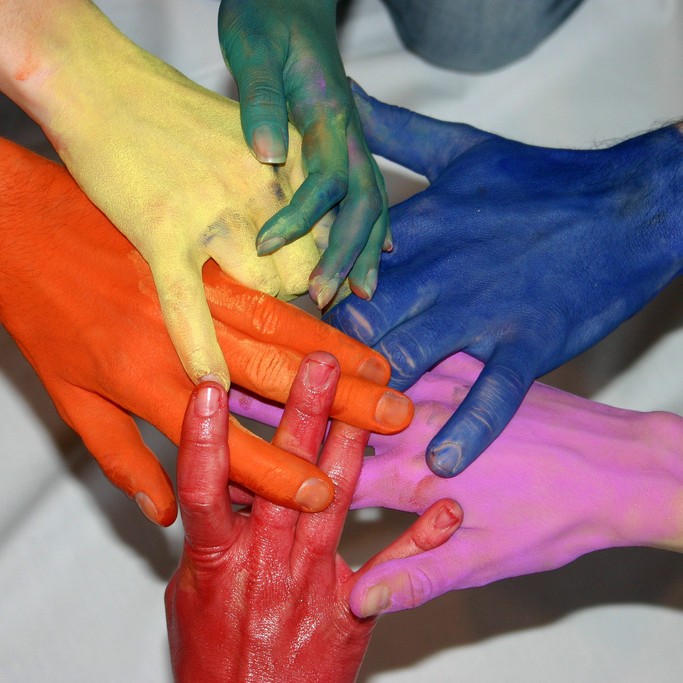
QUEER IDENTITY AND SOCIAL JUSTICE
This Think Tank will address three central questions. What is queer? What is activism? What is social justice? Each question has countless answers, and thus remains unanswerable in the minds of some people. At the same time, others have clearly staked a claim to their idea of the “best” answer to these complex questions. The class will formulate our own (non)answers to these questions, reading about how others do (not) answer them, and learn from community activists who grapple with these questions in their daily lives and work. This kind of investigation will allow students to deconstruct their own identities as well as the ways they are shaped by local and national politics, cultures, ideologies, discourses, mediated representations, and institutional and individual practices.
By the end of the first semester, students will be adept at using a newly formed academic lens to examine identity and social justice issues. The class will consider and critique historical and contemporary attempts by activists and institutions to find middle ground on issues often facing those in the LGBT community. In the second semester, we will develop our voice and place in this contemporary landscape by implementing our own brand of strategic outreach. By the end of the year, Think Tank participants will have examined and reshaped their self-identities, strengthened community networks, and implemented an innovative strategy to raise awareness, promote inclusion and reduce discrimination.

Queer Advocacy Final Report & Project Video
Faculty
Kim Hackford-Peer
Gender Studies Program
Dr. Kim Hackford-Peer joined the Gender Studies Program at the University of Utah as the Associate Director/Assistant Professor (Lecturer) in June 2011. In this capacity she works with her colleagues to manage the interdisciplinary program, advise students, and teach. She is a co-founder of Go YoU, a pathway program collaboration between the Women’s Resource Center, the Gender Studies Program, and Bryant Middle School’s Afterschool Program. She is involved in multiple educational and political action efforts in the state of Utah including work to reform current adoption legislation. Kim also partners with the Planned Parenthood Association of Utah to develop and deliver “Safe at Schools” trainings for educators. She volunteers at her children’s elementary school, is an avid supporter of the University of Utah Youth Theatre Program, and is on the Board of Directors for Bad Dog Arts.
Kim became “Dr. Mamma Kim” in 2010 when she graduated from the University of Utah with a PhD in Education, Culture, & Society. Her dissertation “Mentoring the Imagination: Lesbian, Gay, Bisexual, Transgender, Queer and Questioning Youth Engaging and Expanding Mentoring in Utah” considers the multiple ways that LGBTQ youth experience mentoring. She follows the participants’ lead to call for, and present, possibilities for mentoring that include interactions and moments in time that expand our ability to (re)imagine – in order to (re)create – ourselves outside of our current contexts. Kim was a TA for the ECS Departments as well as a recipient of both the Steffenson Cannon Scholarship and the Point Foundation Scholarship. Point Foundation is a national organization that “provides financial support, mentoring, leadership training and hope to meritorious students who are marginalized due to sexual orientation, gender identity or gender expression.” As a Point Alum, she enjoys serving as a mentor to Cara Cerise, currently the only other Point Scholar to attend college in the state of Utah. Kim was recently invited to join the Point Foundation’s National Board.

Kim’s most treasured moments are spent with her family. Ruth, her partner (of 16 years) is in her final year of Law School at the University of Utah. Together they have two children, Riley (11) and Casey (6) who attend public school and keep their mammas more than busy! The family spends free time together in the garden, cooking, listening to music, playing board games, and going for nightly neighborhood walks and bike rides.
Kilo Zamora
Inclusion Center
Kilo Zamora is the Executive Director of the Inclusion Center for Community and Justice. In 2000, he graduated from the University of Utah with a Masters Degree in Social Work. Kilo has been involved with the Inclusion Center’s since 1992, when he attended their human relationship camp Anytown. There, his drive for equality was born and he has spent the last twenty years implementing human relations work and becoming one of the best facilitators in the !eld. In this time, Kilo has worked with groups both locally and nationally to build a more just community for all people. Kilo is at his best when developing dialogues to foster self-awareness, organizing communities and creating inclusive solutions to divisive issues. His skill set is unique in that he has facilitated dialogues with over 100,000 people. As part of the Inclusion Center staff, he has been awarded the Pete Suazo Social Justice Award, Equality Utah Award, Utah Education Association Award, and Utah Martin Luther King Award, Southern Utah University Humanitarian Award and School of Social Work, University of Utah’s Outstanding Young Alumni Award.
Currently, he is an adjunct teacher in the College of Social Work at the University of Utah, Salt Lake City Human Rights Commissioner and Head Start Advisor. He has also been spending a lot of time develop workshops in the following areas:
• Facilitator trainings
• Intersectionality of race, class and gender
• Identifying how oppression has become a cyclical social disease that spreads by people becoming both
perpetrators and victims.
• Understanding the connection between racism, classism, and environmental degradation.
